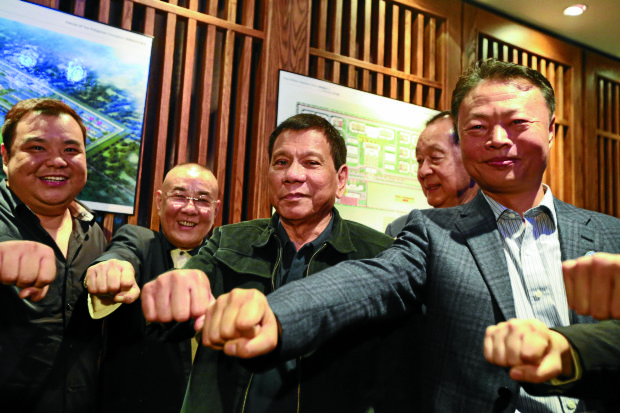
President Rodrigo Duterte along with Chinese Ambassador to the Philippines Zhiao Jianhua and officials of the Friends of the Philippines Foundation poses for a photo at Dadong Roast Duck Restaurant in Beijing, China on October 19. KING RODRIGUEZ/Presidential Photo
BEIJING—At least eight government-to-government deals are expected to be signed between the Philippines and China on Thursday, including an agreement that will boost President Duterte’s campaign against illegal drugs.
The deals do not include joint exploration for energy in the West Philippine Sea, waters in the South China Sea within the Philippines’ exclusive economic zone (EEZ).
The Inquirer, quoting senior administration officials who spoke on condition of anonymity, reported on Wednesday that talks were going on between Philippine and Chinese officials for joint exploration in an uncontested area of the South China Sea, including Recto Bank.
Joint exploration
Speaking to journalists at the Grand Hyatt Hotel in Beijing, Mr. Duterte said there would be no discussions with Chinese officials about joint exploration.
“I do not think that would be right [to propose to Chinese President Xi Jinping],” Mr. Duterte said. “If you plan to give up something, if you plan to share what you have, if it is really yours, then you cannot talk about it openly on your own.”
Congressional nod required
He explained that any proposal for joint exploration requires “the consent of Congress and every Filipino involved.”
“So at this time, I am not empowered to do that,” Mr. Duterte said. “I cannot give something, and I cannot also add what has not been given me.”
Mr. Duterte, in China for a state visit, will witness the signing of the agreements at Hebei Room of the Great Hall of the People here.
Based on confidential documents obtained by the Inquirer, a “protocol on cooperation” is in the works between the Philippine Drug Enforcement Agency (PDEA) and the Narcotics Control Bureau of China’s Ministry of Public Security.
PDEA Director General Isidro Lapeña is expected to sign the cooperation deal on narcotics control.
It is widely believed that many of the drug lords operating in the Philippines have links to drug kingpins in
China.
The Philippine delegation is also working on several other bilateral agreements covering economic and investment cooperation, strengthening of trade links, conduct of feasibility studies involving commerce, financing cooperation and tourism.
This landmark state visit to China is thus seen to resolve the diplomatic chill between the two countries, whose relationship had turned sour in the last three years due to a territorial dispute.
Scarborough Shoal
China was reported on Tuesday as considering giving Filipino fishermen conditional access to Scarborough Shoal, which China seized from the Philippines in 2012, forcing Manila to challenge Beijing’s claim to 90 percent of the South China Sea in the UN-backed Permanent Court of Arbitration in The Hague.
The court handed down a decision on July 12, invalidating China’s claims and ruling that Beijing had violated Manila’s sovereign rights to fish and explore for resources in waters within its 370-kilometer EEZ in the South China Sea.
Scarborough Shoal, known to Filipinos as Panatag Shoal, is well within the Philippines’ EEZ.
China, which did not take part in the arbitration, rejected the tribunal’s decision, calling it “waste paper.”
Mr. Duterte has said he will not raise the tribunal’s ruling during his visit.
Almost 100 deals
Since 1975, when the Philippines established diplomatic ties with China, the two countries have concluded almost 100 bilateral agreements covering political, defense, trade and investments, judicial cooperation, air services, cooperation in combating transactional crimes, consular cooperation, tourism, culture, sports, media exchange, agriculture, science and technology, sister cities and people-to-people exchanges.
In 2015, Philippine exports to China amounted to $17.64 billion, while imports stood at $6.17 billion.
China ranked as the Philippines’ second largest trading partner last year. It remains the Philippines’ third largest export destination and the biggest source of imports. TVJ
RELATED VIDEOS
[ventuno id=’ODM5ODM3fHwyMzY4fHwxMDg2fHwxLDIsMQ==’][/ventuno]
[ventuno id=’ODM5ODU1fHwyMzY4fHwxMDg2fHwxLDIsMQ==’][/ventuno]

